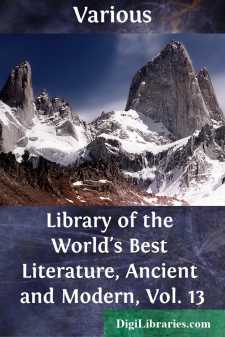Categories
- Antiques & Collectibles 13
- Architecture 36
- Art 48
- Bibles 22
- Biography & Autobiography 813
- Body, Mind & Spirit 142
- Business & Economics 28
- Children's Books 17
- Children's Fiction 14
- Computers 4
- Cooking 94
- Crafts & Hobbies 4
- Drama 346
- Education 46
- Family & Relationships 57
- Fiction 11829
- Games 19
- Gardening 17
- Health & Fitness 34
- History 1377
- House & Home 1
- Humor 147
- Juvenile Fiction 1873
- Juvenile Nonfiction 202
- Language Arts & Disciplines 88
- Law 16
- Literary Collections 686
- Literary Criticism 179
- Mathematics 13
- Medical 41
- Music 40
- Nature 179
- Non-Classifiable 1768
- Performing Arts 7
- Periodicals 1453
- Philosophy 64
- Photography 2
- Poetry 896
- Political Science 203
- Psychology 42
- Reference 154
- Religion 513
- Science 126
- Self-Help 84
- Social Science 81
- Sports & Recreation 34
- Study Aids 3
- Technology & Engineering 59
- Transportation 23
- Travel 463
- True Crime 29
Our website is made possible by displaying online advertisements to our visitors.
Please consider supporting us by disabling your ad blocker.
Library of the World's Best Literature, Ancient and Modern, Vol. 13
by: Various
Description:
Excerpt
TORU DUTT
(1856-1877)
n 1874 there appeared in the Bengal Magazine an essay upon Leconte de Lisle, which showed not only an unusual knowledge of French literature, but also decided literary qualities. The essayist was Toru Dutt, a Hindu girl of eighteen, daughter of Govin Chunder Dutt, for many years a justice of the peace at Calcutta. The family belonged to the high-caste cultivated Hindus, and Toru's education was conducted on broad lines. Her work frequently discloses charming pictures of the home life that filled the old garden house at Calcutta. Here it is easy to see the studious child poring over French, German, and English lexicons, reading every book she could lay hold of, hearing from her mother's lips those old legends of her race which had been woven into the poetry of native bards long before the civilization of modern Europe existed. In her thirteenth year Toru and her younger sister were sent to study for a few months in France, and thence to attend lectures at Cambridge and to travel in England. A memory of this visit appears in Toru's little poem, 'Near Hastings,' which shows the impressionable nature of the Indian girl, so sensitive to the romance of an alien race, and so appreciative of her friendly welcome to English soil.
After four years' travel in Europe the Dutts returned to India to resume their student life, and Toru began to learn Sanskrit. She showed great aptitude for the French language and a strong liking for the French character, and she made a special study of French romantic poetry. Her essays on Leconte de Lisle and Josephin Soulary, and a series of English translations of poetry, were the fruit of her labor. The translations, including specimens from Beranger, Theophile Gautier, Francois Coppee, Sully-Prud'homme, and other popular writers, were collected in 1876 under the title 'A Sheaf Gleaned in French Fields.' A few copies found their way into Europe, and both French and English reviewers recognized the value of the harvest of this clear-sighted gleaner. One critic called these poems, in which Toru so faithfully reproduced the spirit of one alien tongue in the forms of another, transmutations rather than translations.
But marvelous as is the mastery shown over the subtleties of thought and the difficulties of translation, the achievement remains that of acquirement rather than of inspiration. But Toru's English renditions of the native Indian legends, called 'Ancient Ballads of Hindustan,' give a sense of great original power. Selected from much completed work left unpublished at her too early death, these poems are revelations of the Eastern religious thought, which loves to clothe itself in such forms of mystical beauty as haunt the memory and charm the fancy. But in these translations it is touched by the spirit of the new faith which Toru had adopted. The poems remain, however, essentially Indian. The glimpses of lovely landscape, the shining temples, the greening gloom of the jungle, the pink flush of the dreamy atmosphere, are all of the East, as is the philosophic calm that breathes through the verses. The most beautiful of the ballads is perhaps that of 'Savitri,' the king's daughter who by love wins back her husband after he has passed the gates of death. Another, 'Sindher,' re-tells the old story of that king whose great power is unavailing to avert the penalty which follows the breaking of the Vedic law, even though it was broken in ignorance. Still another, 'Prehlad,' reveals that insight into things spiritual which characterizes the true seer or "called of God." Two charming legends, 'Jogadhya Uma,' and 'Buttoo,' full of the pastoral simplicity of the early Aryan life, and a few miscellaneous poems, complete this volume upon which Toru's fame will rest.
A posthumous novel written in French makes up the sum of her contribution to letters. 'Le Journal de Mlle. D'Arvers' was found completed among her posthumous papers. It is a romance of modern French life, whose motive is the love of two brothers for the same girl. The tragic element dominates the story, and the author has managed the details with extraordinary ease without sacrificing either dignity or dramatic effect. The story was edited by Mademoiselle Bader, a correspondent of Toru, and her sole acquaintance among European authors. In 1878, the year after the poet's death, appeared a second edition of 'A Sheaf Gleaned in French Fields' containing forty-three additional poems, with a brief biographical sketch written by her father. The many translators of the 'Sakoontala' and of other Indian dramas show how difficult it is for the Western mind to express the indefinable spirituality of temper that fills ancient Hindu poetry. This remarkable quality Toru wove unconsciously into her English verse, making it seem not exotic but complementary, an echo of that far-off age when the genius of the two races was one.
JOGADHYA UMA
"Shell bracelets, ho! Shell bracelets, ho!Fair maids and matrons, come and buy!"
Along the road, in morning's glow,
The peddler raised his wonted cry.
The road ran straight, a red, red line,
To Khigoram, for cream renowned,
Through pasture meadows where the kine,
In knee-deep grass, stood magic bound
And half awake, involved in mist
That floated in dun coils profound,
Till by the sudden sunbeams kist,
Rich rainbow hues broke all around.
"Shell bracelets, ho! Shell bracelets, ho!"
The roadside trees still dripped with dew
And hung their blossoms like a show....












